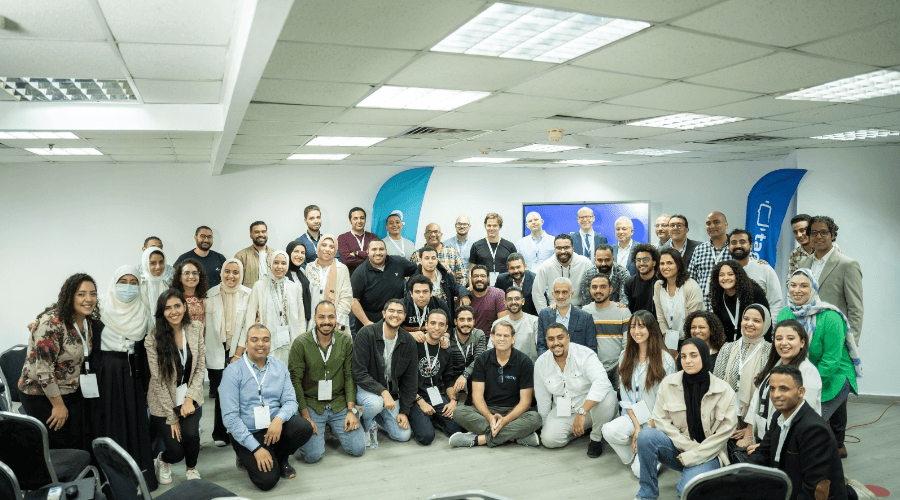Tactful AI: Tracing the pivots before the exit

In 2016, Egyptian entrepreneur Mohamed Elmasry moved to the UK, in hopes of building a local tech product with global know-how and impact. Towards that end, Elmasry along with Sherif Khairalla and Mohammed Hassan set up Tactful AI to leverage AI capabilities and data analytics to improve consumer engagement, with the majority of its product development processes taking place in Egypt.
“Deeptech companies are incredibly rare in the region, so I was looking to give rise to a new generation of entrepreneurs that can develop world-class software solutions and build tech businesses, not only tech-enabled businesses. Truth is, access to talent in this very area is very limited in the region,” Elmasry says.
But, the founders' quest to build a global product was a hard-wrung journey, one punctuated by multiple pivots and course corrections.
Prior to founding Tactful AI, Elmasry's entire career revolved around developing semiconductors, smart home gadgets and equipment as well as industrial control. Building on this, he started Tactful AI as an attempt to simplify the consumer experience in the field of home automation, which is too technical and complex for the mainstream consumer, an issue that holds back growth in this market. So the company started off as a marketplace for smart home technologies and gadgets, connecting vendors with customers, providing after-sale support as well as enabling vendors to detect consumer patterns using AI.
“In such a highly complicated market, the inability of consumers to make a correlation between their needs and technologies is the elephant in the room. The solution was meant to simplify the consumer experience; besides, the market was very fragmented and lacked a good platform that can unify these devices and make them work together,” he explains.
But the main challenge facing the startup at that point in time was not knowing how to scale the platform on the business-to-consumer B2C front. From there, the startup shifted gears and decided to focus solely on business-to-business (B2B) operations.
"The product was meant to do what it did in terms of functionality but the founding team lacked the experience in how to scale it. On the plus side, it was doing really well on the vendor front. That's why we decided to launch the B2B service to help businesses facing challenges [relevant] to long sales cycles and customer conversion. Simply put, the idea of the modified product was to develop a technology that simplifies the customer journey, commercialise and sell it to other businesses," he adds.
Customer engagement
Once he realised that the technology alone is not sufficient to ensure a streamlined customer experience, the startup’s product quickly evolved into a full-blown consumer engagement tool, catering to businesses across diverse industries. And once again, Tactful AI was off to another tangent.
"For a customer engagement solution to effectively work, there are too many more variables to consider and a lot of investments in data and staff training to be done, in order for a business to eventually realise better outcomes. That's how we managed to give shape to the solution that we have today. Plus, it is a huge market expected to be worth $50 billion in the next five years," Elmasry adds. "Through Tactful, we are trying to solve the problem of customer acquisition and retention facing businesses worldwide, including in the Middle East, enabling them to conduct quality control processes at a larger scale."
The solution currently provided by Tactful AI is at the intersection of customer engagement, automation, and data analytics. It helps connect customer experience departments together through a signal dashboard where they can monitor the entire sales journey, engage directly with customers, pinpoint what services are falling short and accordingly make changes to improve the customer experience.
Last year, Tactful AI was acquired by global business communication solutions provider Dstny group; the deal helped the company broaden its global reach and reach more clients in other regions including in Europe. But the majority of its clientele is from the Middle East and North Africa region along with some African markets, where it serves larger-sized companies operating across the public sector, ITC, banking and retail. The company counts retail conglomerate El-Araby Group, Mubadala Investment Company and Abu Dhabi Commercial Bank (ABCB) among its clients.
Recently, the Mena has seen the entry of multiple global companies looking to offer solutions to automate various aspects of business communication. This rise in demand is accredited to the density of the population in these regions and the increased rates of consumption.
"Consumers in these markets are cost conscious and businesses are always trying to improve efficiency while simultaneously reducing overhead costs without compromising the quality of the product and the customer experience. More and more are realising that AI improves the journey of customers and AI adoption proves to be the only way to achieve this equilibrium," concludes Elmasry.


